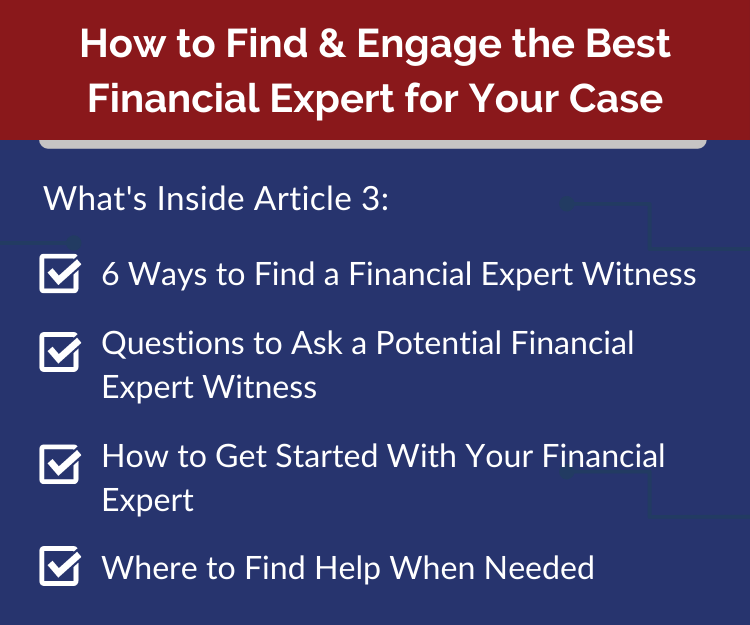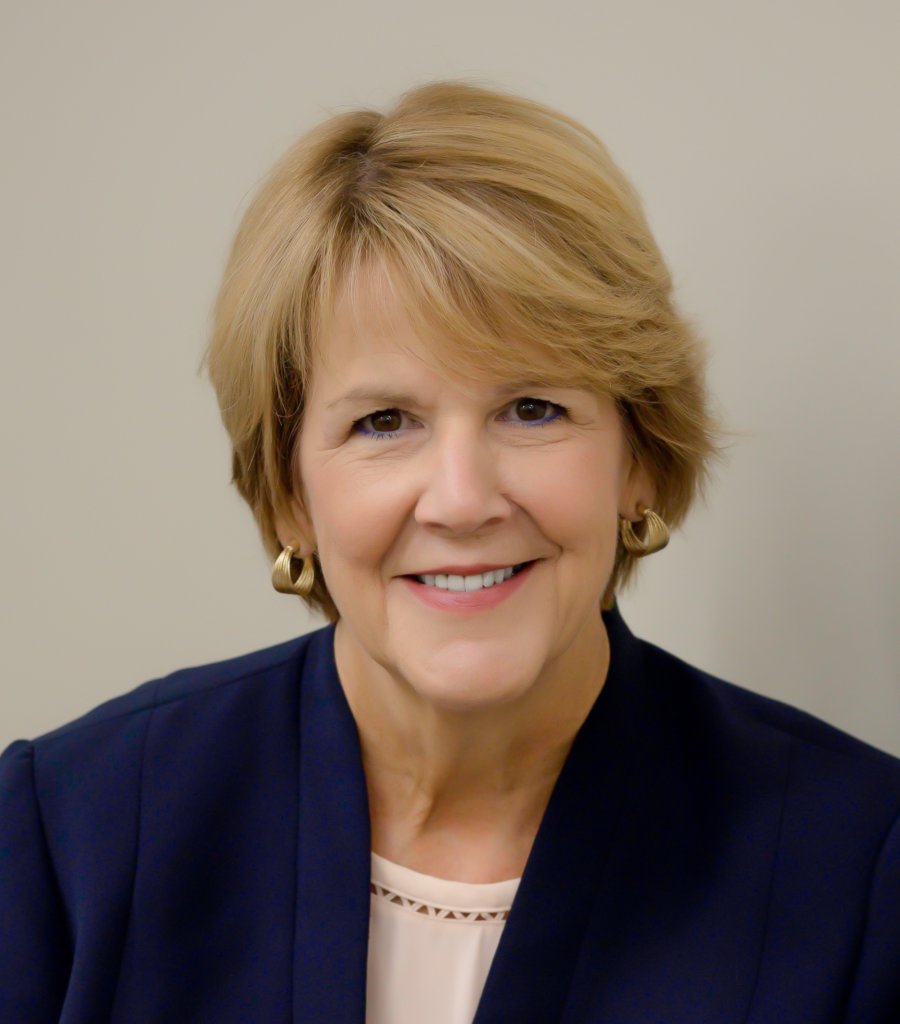
Article 3: How to Find & Engage the Best Financial Expert for Your Case

Welcome to the third installment in this article series on how to benefit from working with a financial expert in business litigation. If you missed the last article discussing the “who” of hiring an expert, which explored the traits and capabilities that are most important, you can find it here. This time, we are exploring how to find and engage the right financial expert.
As we covered in the last article, it’s important to hire the best expert available based on the specific needs of each case, because this choice can significantly impact how efficiently the process works, the damage conclusion, and the credibility of that conclusion. So, how do you go about identifying the right expert?
In our experience, we’ve found there are a number of ways attorneys find credible financial expert witnesses.
6 Ways to Find a Financial Expert Witness
- 1. Referrals are generally the most common method, as you get real-world feedback from others you respect who have firsthand experience working with the expert. Ask other lawyers at your firm, as well as attorneys you know and respect outside your firm.
- 2. Consider earlier cases and the experts you deposed or cross-examined.
- 3. The ASA website (American Society of Appraisers) www.appraisers.org has a Find An Appraiser search function that allows you to search by name, location, geography, discipline, specialty, industry, the purpose of the appraisal, experience, and several other factors. In many situations, it is not necessary for your financial expert to be local; however, it is important to think about their experience in terms of both State and Federal courts when you are looking for the right fit. While the ASA’s focus is on business appraisers, many are also business damages experts. This site can be particularly helpful when you need an expert from a different state than yours.
- 4. The Expert Institute is a resource for hiring experts as well as finding experts. Information is available at www.expertinstitute.com.
- 5. Respective State Bars frequently have lists of experts or are familiar with those who are writing and teaching within the legal community.
- 6. Other trade association member lists or Google searches. These options ‘throw the net wide’ and make it more time-consuming to filter down to the best candidates to interview. Keep in mind there is a wide range of accreditations and experience in this field. We recommend you prioritize referrals within your network and the ASA website as you create a shortlist of potential experts.
Questions to Ask a Potential Financial Expert Witness
During your selection process, here are 10 important questions to ask of your potential financial expert.
- 1. Very likely the most critical question:—are they independent? Are they part of an independent, unbiased firm or do they have other relevant professional/client relationships? Is it real independence or a shell of independence (same company with a different subdivision or subsidiary)? Also, does the expert do a significant amount of work for the same attorney?
- 2. Have they had any formal training or continuing training in providing expert opinions under pressure?
- 3. Are they an experienced witness in the courtroom? What is their experience in State court or Federal court? What percentage of their work involves damages analysis and litigation support? This latter question is especially important, as it isn’t necessarily important to know how many times the expert has testified but rather how many times have they been hired to provide a written opinion. More often than not, a well-researched and written conclusion of damages will lead to a settlement, avoiding trial. While understanding the court procedure, the better question might be, “How many expert reports have you written?”
- 4. Do they offer pre-trial consulting services or serve only as an expert witness? Remember, getting an early read on a case from a consultant/expert can help you frame the issues and save you and your client a lot of time, money and trouble.
- 5. Are they identified as typically working with one side or another? For example, plaintiff/defendant, insurer/insured, employer/employee.
- 6. Are they self-motivated and experienced enough to hit the ground running and work directly with the client or will it require a lot of your hand-holding? Will the expert stay in communication with you so you’re not left wondering where they are on the project?
- 7. What is their process and expected timeline? Ask them to articulate their process paralleled with their timeline, and you’ll get a feel for how well they know what they’re doing.
- 8. What portions of the analysis will they do personally relative to their staff? While using support staff and containing fees is an ongoing goal, this is an area where the expert is always more credible if they have done the work that is critical to the conclusions reached.
- 9. Are there any issues in the expert’s personal background that could be relevant? Lawsuits, criminal record, publicity, articles in publications, published cases. Have they ever lost a Daubert challenge?
- 10. What are their billing procedures, rates, and terms? What level of detail do they provide in their billing? You will want to understand the billing relationship before hiring—not after the first invoice arrives.
How to Get Started With Your Financial Expert
Once you have selected the financial expert for your case, it’s important to get off to a strong start. As we covered earlier, the sooner the financial expert joins the team, the sooner they can consult on various approaches to consider and identify documents that are needed.
- Define the scope of the project in a written engagement letter that is signed by two parties. First, by you, the attorney, agreeing to the scope as defined; and second, by the client agreeing to be responsible for financial compensation of the expert.
- Discuss early on with the expert what is discoverable—notes, emails, cover letters, report drafts, electronic files, etc.
- Provide all relevant materials. Many times it is difficult for counsel to know what can be useful to the financial expert. If you hold back documents that contain information that you consider to be unfavorable to your position and the other side brings up these documents on cross examination of your witness, it is an immediate blow to your expert’s credibility. Losing credibility with a judge or jury can mean disaster. Err on the side of allowing the expert to review all indexes and/or documents to determine what is meaningful to them in their analysis.
- Provide key dates as soon as they are known. The last thing you want is to miss a key date and limit the resources you’re able to provide to the financial expert or worst case, find out your expert is not available.
Coming Up Next Time
Next time, we’ll move beyond the hiring phase and take a deeper dive into the work of a damages expert.
We’re Here to Help
Hiring the right financial expert can have a significant impact on your case. If you have further questions about how to evaluate the credibility, experience, and communication skills of a financial expert, let us know.
With our firm’s 45+ years of experience focused exclusively on calculating damages for litigation and business valuation, we use our expertise to form effective working relationships with attorneys so you can best serve your clients.
Stay tuned to your inbox and follow Capital Valuation Group on LinkedIn as we share more from this article series on how to successfully navigate each phase of the litigation process. If you have a particular situation you would like to discuss, give us a call. We are happy to have a complimentary initial discussion.
Would other people in your firm find value in this series? They can subscribe to our email list here.

Cathy Durham is a principal of Capital Valuation Group, Inc., headquartered in Madison, WI. Capital Valuation Group has been helping business owners across the country understand, increase and unlock the value of their businesses for over 40 years through keynote speaking, valuation analysis, determining damages and providing expert witness testimony. Cathy welcomes conference and event speaking inquiries and can be reached at cdurham@capvalgroup.com. Phone 608-257-2757
